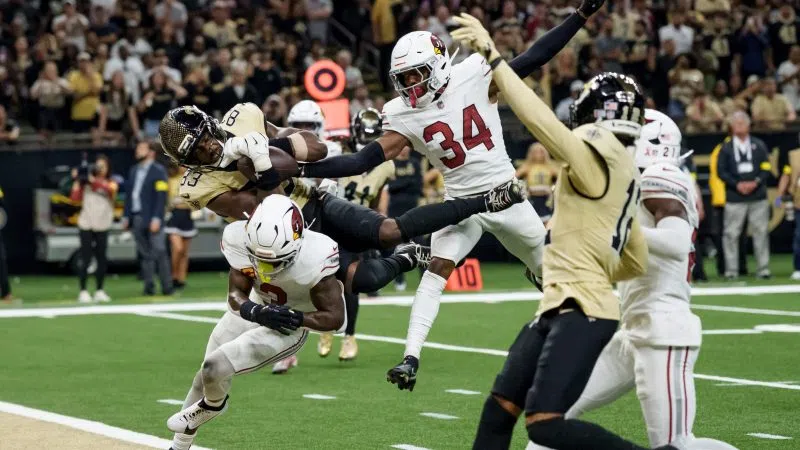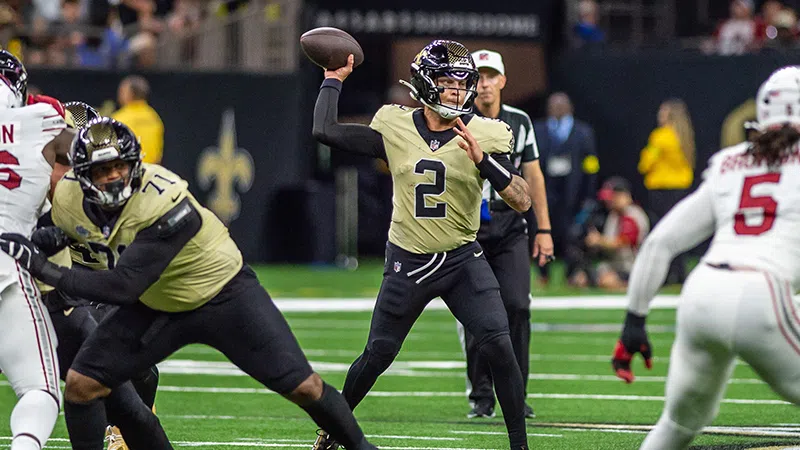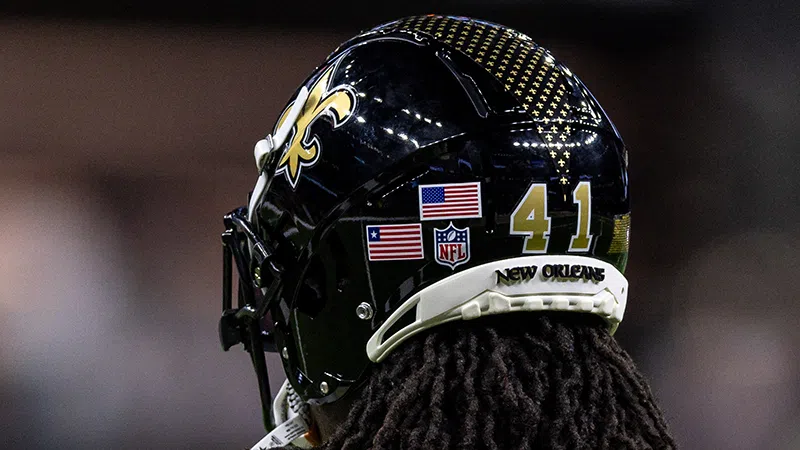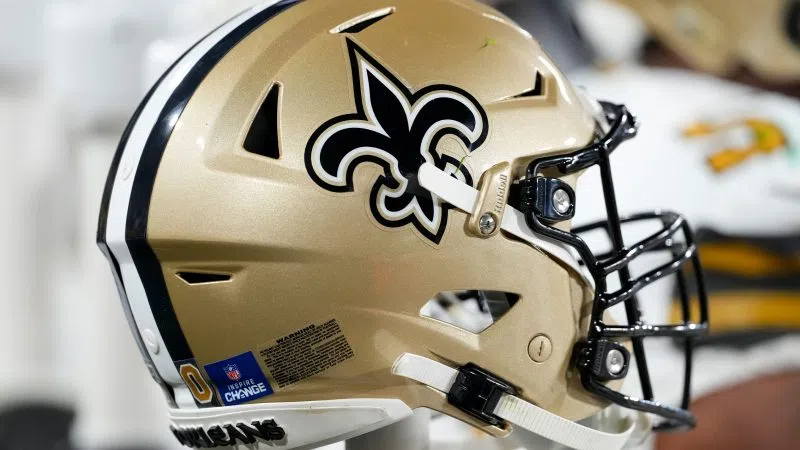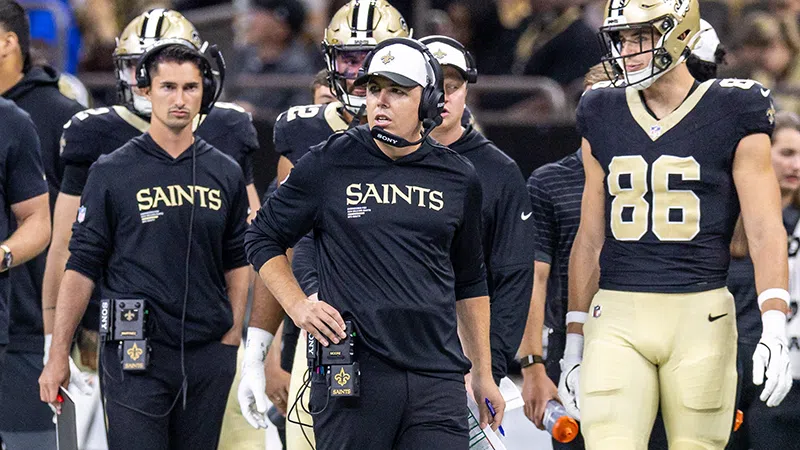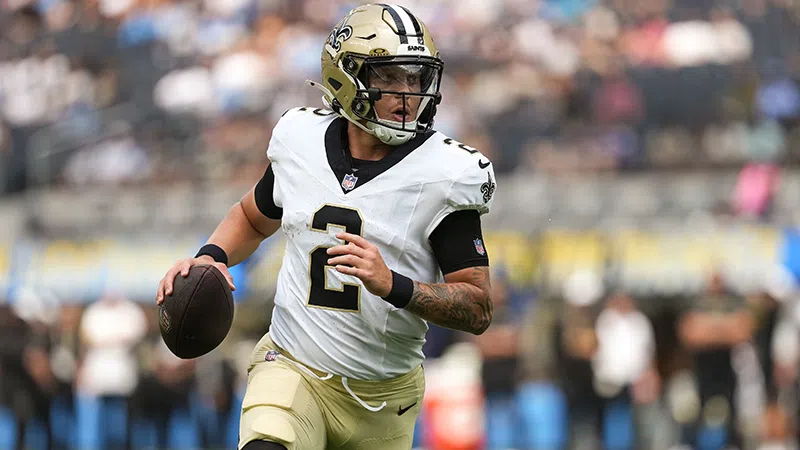
Jon Endow-Imagn Images
By Ross Jackson
As the NFL kicks off Week 1 of the 2025 season, history will be made. Across the 32-team league, 16 Black quarterbacks will start this week.
Among them will be New Orleans Saints quarterback Spencer Rattler. The second-year quarterback won the starting job in camp and now gets to be a part of a pivotal moment in the league’s history books.
“It’s a pretty momentous situation,” Rattler said. “Half the league in Week 1, 16 Black starters. It’s obvious the game is changing. And growing up, I feel like it was only Mike Vick and Cam Newton, and a few Black quarterbacks. So to have 16 of them starting Week 1, I mean, that’s very cool for the younger generation too. To (see that they can) play quarterback, and not get boxed into (being) just an athlete.”
Exactly half of the league will start Black quarterbacks, which breaks the previous record of 15 last year. This follows the first ever Super Bowl which featured a pair of starting Black signal callers competing for the Lombardi Trophy.
One of the coaches that overlaps with both of these milestones is Saints head coach Kellen Moore. He was the offensive coordinator for Jalen Hurts’ Super Bowl run with the Philadelphia Eagles and is now one of the 16 coaches whose offenses will be orchestrated by quarterbacks that are breaking a long-standing stigma in the NFL.
“It’s really cool to see the development that the quarterback position has taken,” said Moore. “So many guys have come in and really evolved that position at the same time as well, and played it in a lot of different styles. And I think it’s created such a cool, creative side to our football game and now our quarterback position is playing at the highest level it ever has.
“What Spencer has done, looking back at the Super Bowl with Jalen (Hurts) and Patrick (Mahomes) and the history that was created, those guys are impact players. They’re special players. And so it’s been really cool to see.”
Moore continued, highlighting Rattler’s hard work that has led to him being a part of this moment.
“Spencer’s earned this opportunity,” he said. “The coolest thing is, he’s gone out and just played a tremendous training camp, putting him in a really good position.”
Ideally, the race for the starting quarterbacks across the NFL wouldn’t even be a consideration. But in order for that to be the case, moments like this must first be appreciated. The measure of progress is not marked by what’s chosen to be ignored, but what is achieved, accepted and celebrated. After that, these conversations become closer to normal.
Players like safety Justin Reid see that kind of advancement on the way.
“The beautiful part is, hopefully this gets to one day be a conversation where no one even notices or talks about the race of the quarterback when they’re playing,” he said. “If we’re at 50 percent then hopefully that day is sooner than later.
“More than anything, I feel like scouts now are just evaluating talent. There was a stigma, years and years ago, that was, ‘I don’t know if this guy is smart enough to play the position.’ Or ‘This guy should be a running back, he can’t play quarterback,’ just because he’s athletic or whatever it is. But the dual-threat quarterback position is becoming a standard in the NFL. It doesn’t matter if you’re Josh Allen or Lamar Jackson, everyone’s looking for that guy. If you can play the position and you deserve to be out there, then you’ll be out there. It doesn’t matter what your ethnicity is.”
Not long ago, the quarterback position was often considered out of reach for Black players, due to stereotypes about talent, intelligence, and playing style. Today’s NFL not only disproves those old assumptions, but also showcases Black quarterbacks among the league’s top players.
“I think it breaks a stigma that either Black people aren’t good enough, or Black players aren’t smart enough to play the position,” tight end Juwan Johnson said of the record’s importance. “To know that at the highest level, that it’s increasing in number. They’re not just quarterbacks, they’re top players in our league that are starting quarterbacks in prominent organizations. I think it’s big. I want to have a son one day, and if he wants to play quarterback, he can definitely do that. And so it’s really fun to see that the game is evolving and that it’s more accepting, because it wasn’t always like that.”
Young, Black players watching this week’s NFL action now have a 50 percent shot of seeing themselves represented on teams, excelling in the most challenging position in professional sports and as faces of NFL franchises. That could be an immeasurably impactful moment for a child with the dream of being an NFL quarterback.
It’s especially important in New Orleans, a predominantly black city. Rattler will become the fourth black Week 1 starting quarterback for the franchise.
“It’s history,” wide receiver Rashid Shaheed said. “It’s history that Spencer is part of this organization in a city that is predominantly Black. I think it’s super cool to have him as our starting quarterback. It’s great for the city of New Orleans, it’s great for the league and it’s always good to have faces like that around and playing.”
The first Week 1 black starter at the position in franchise history was Jeff Blake in 2000. He was followed by Aaron Brooks in 2001. 20 years later, Jameis Winston led the way in 2021.
Quarterback Teddy Bridgewater also started several games in 2018 and 2019, even though he wasn’t a Week 1 starter.
Spencer Rattler will see his first opening week start this weekend, which will be his seventh career start.
The knee-jerk reaction to feats like this is the assumption that bringing race into the conversation at all is harmful. But while 16 Black starting quarterbacks is new, what isn’t is sport’s ability to lead the way in promoting racial progress throughout history, as linebacker Demario Davis highlighted when asked why this moment is important.
“I think it furthers the legacy of the game and where it’s come just over the years, and what sports mean to our country,” he said. “I think it’s just incredible how sports has led the way in shaping a better nation. When you think about integration and how sports played a big part in that, when you think about some of our most challenging and segregated areas, how sports has continued to bring the world together, even now with politically tense climates, sports continue to bring us together.”
While this moment in NFL history is an important one, as is always the case with progress, there’s more to be done.
“I’m proud of our league for continuing to advance that with the quarterback position,” Davis said. “But I think there’s still even more work that can be done. Just in terms of the executive level and ownership, just continuing to make sure that we’re thinking about equity and equality across the board.”



